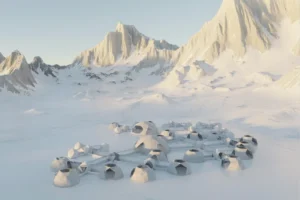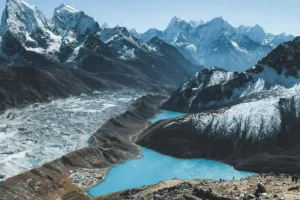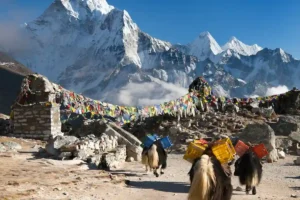
Tourism can only be regenerative
By Frédéric Kauffmann, CEO & Founder The NeverRest Project

Tourism can only be regenerative. There is no other way to restore all the balances lost in many decades. The result, we already know. In the Atacama Desert (Chile), thousands of tons of clothing accumulate, millions of garments that turn the desert into a colossal landfill. In the Pacific, as we know, between Hawaii and California, there is a huge island of garbage – mainly composed of plastic – whose dimensions are estimated at three times the size of France.
These problems are multiplied and aggravated in developing countries, where tourism is, in many cases, one of the main support of the local economy. That’s where the perfect storm takes place.
On one hand, the globalized tourism and transport usually has a negative impact on the final professionals and locals, who are the worst paid of the whole chain. We need to break with these vacation colonialist way of traveling. On the other hand, from other perspective -the local perspective-, we find precariousness in workers, fear of putting limits to the golden goose, the lack of resources – education and training of their professionals -, aspects added to a spirit still rooted in survival rather than in the long term compose an explosive formula that is triggered by the spark of a presumptuous client, who would never do in his city what he does in other places he visits, and willing to bargain for cents that he would never dispute in his country. The wasteful consumption of a few has consequences for many.
A global challenge
The challenge of well-ordered tourism is global, as it is the environmental challenge. Never before we’ve had so many resources devoted to trying to reduce our impact, whether when we travel or not. The 2030 Agenda or the European Green Deal are some examples. The change is collective, individual, transversal and no one is exempt.
It is necessary to grow from the individual to the collective. Individual responsibility as a generator of collective change. That is why, at this point, I want to talk about consuming nature.
Consuming nature
There is no more synthesized expression of such a complex idea based on our (new) habits. Consuming nature means exhausting places. It means fast food nature. It means nature to use and throw away. Nature likes going to the mall and ransacking it on a Saturday afternoon, as a result of consumer dynamics that have more and more detractors, such as defenders of regenerative tourism. Because no one wants to travel to a damaged or contaminated place, right? It is not about ban tourism, but updating it. Because we are in a time of transition between old operations and new ideas and needs. That also is the responsibility of brands and their corporate responsibility.
Regenerative Tourism
Regeneration means reviving or bringing back to life, it goes around life’s values, it means flourishing. In its simplest formula, regeneration is about creating fertile conditions that will make life prosper.
- In short term, regenerative tourism means doing things right. Regenerative Tourism:
- It is a step beyond sustainable tourism, which focuses on reducing negative impacts. Be careful with sustainability, because the sustainable acts are simple: they consist of minimizing an impact, but one can keep acting wrong. Must bring some added value in order to improve the visited destination. It is not about leaving the smallest footprint possible, but about leaving the place we visit better than we found it. It is about putting an end to deterioration.
- It puts the tourist himself as a resource to transformation of the destination. It generates a positive impact in a vacation spot. The tourist is a tool to improve and regenerate local natural resources and to generate a fair distribution of tourism income the local populations.
- It implies that citizens do not feel the presence of tourists as a threat, but as something beneficial.
- Circularity. Not wasting.
- Revitalizes the environment and socioeconomic development of local communities.
- Support local production. Local product, local consumption.
- It thinks in a truly egalitarian way. That means that all people have the right to wealth, power, education, resources, time, space, nature. Let’s define what a good life means to us and let’s help others to achieve it.
To sum up, it is about generating a symbiosis between nature, local communities and visitors, helping to recover ecosystems that have been degraded, ensuring a fair distribution of the benefits generated by tourism and improving the living conditions of the receiving populations of tourism.
This is the kind of tourism that only should be.
Frédéric Kauffmann



